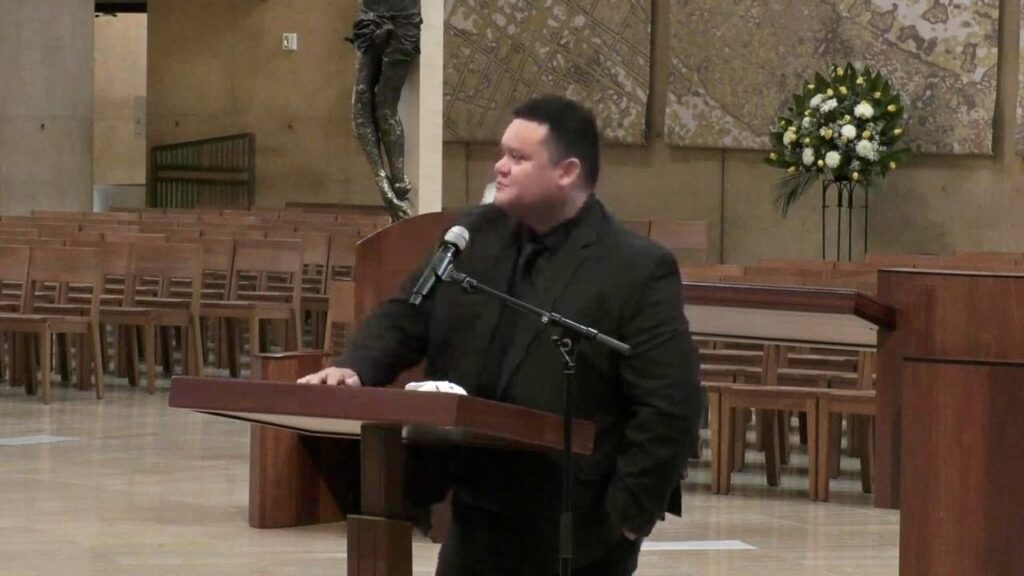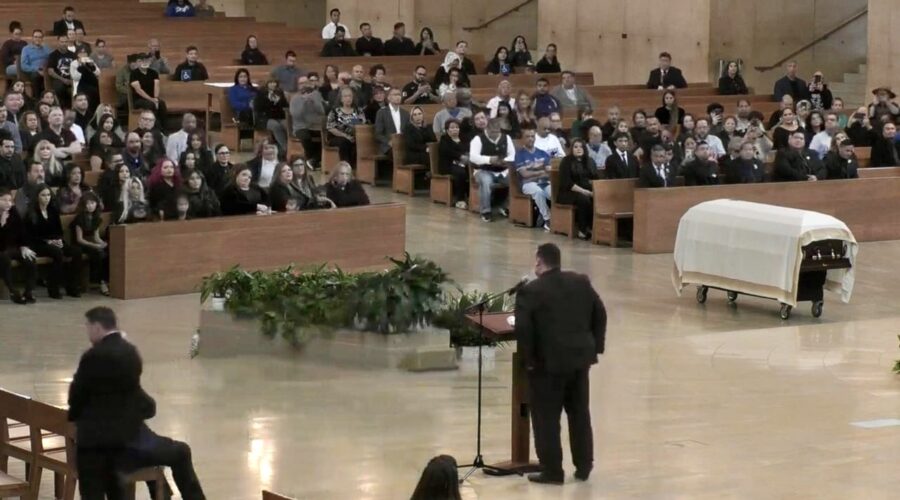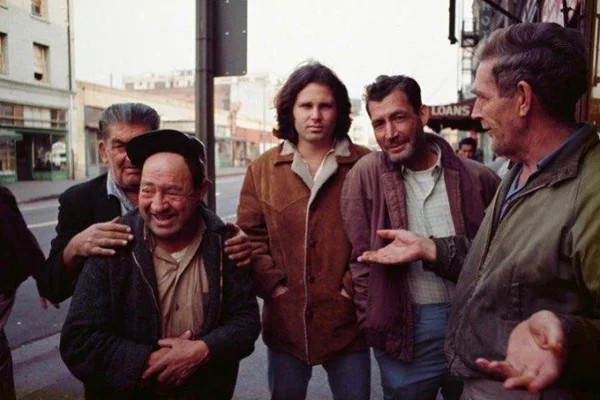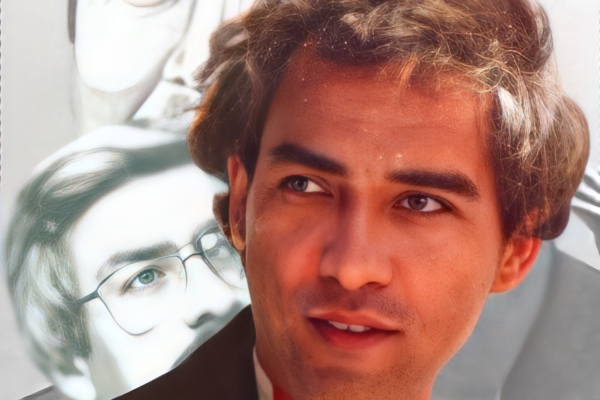A fitting choice of words came from former teammate and catcher Mike Scioscia, who spoke with the kind of reverence reserved for legends: ‘He was a one-of-a-kind talent, a tremendous pitcher with the heart of a lion. You couldn’t get him out of the game.’
At the Cathedral of Our Lady of the Angels, a quiet morning cast a solemn light on rows of familiar faces: family, friends, teammates, and fans, each carrying a thread of Fernando Valenzuela’s story, woven from the brilliance of his youth and the dignified strength of his legacy. His journey was one of triumph, resilience, and pure, untamable love—for the game, for his family, and for a world that came to adore him.
They had come to bid farewell to the pitcher who, for a time, seemed unstoppable, a man with a unique gift and an indomitable spirit. A fitting choice of words came from former teammate and catcher Mike Scioscia, who spoke with the kind of reverence reserved for legends: “He was a one-of-a-kind talent, a tremendous pitcher with the heart of a lion. You couldn’t get him out of the game.” That lion’s heart was Fernando’s alone—unyielding, unbreakable, beating with a quiet but steady force that carried him from a small town in Mexico to the dizzying lights of Dodger Stadium.

at the Cathedral of the Angels Funeral Mass: “My father is gone, he never asked for anything…” Photos by Patricia Casado.
It’s said that greatness begins in the humblest of places. Fernando’s journey began in Navojoa, Mexico, the youngest of twelve children in a small family home. His story was like something out of an old folktale: the youngest son, coming of age in the dusty fields of his homeland, armed only with a fierce passion for baseball and a prodigious talent that, like him, seemed larger than life. When the Dodgers signed him from the Leones de Yucatán in 1979, it marked the beginning of what would become a legend—one that, like all great legends, would eventually grow too vast for just one country to hold.

Fernando’s rise was meteoric, fueled by that infamous screwball, the one Dodgers pitcher Bobby Castillo had taught him in the winter of ‘79. In 1980, he soared through the Texas League as its strikeout king, paving the way for what came next: his extraordinary 1981 season, known forever as “Fernandomania.”
When he took the mound that season, a pitcher still not yet twenty, something unnameable but undeniably powerful happened. He had that rare quality—the kind that couldn’t be taught or manufactured—that left stadiums breathless and fans spellbound. And in a city as expansive and varied as Los Angeles, Fernando brought everyone together. As Scioscia so aptly recalled, every game he pitched wasn’t just for himself but for his family, his faith, his team, and his country. He shouldered that weight gracefully, making it look effortless, even when the load was heavy.
Inside the cathedral, as the soft echoes of hymns gave way to the quiet murmur of prayer, one could almost hear the low rumble of Dodger Stadium, where Fernando was more than a pitcher—he was a symbol, a phenomenon. Generations of Angelenos filled the stands, regardless of their background or where they came from, bound by a love for this unassuming young man who wielded a ball like a magic talisman. Children who’d never set foot in Navojoa proudly waved Mexican flags, joining in a collective roar that would follow Fernando for the rest of his life.
“Humble in victories, gracious in defeats,” Scioscia continued, describing a Fernando known by those closest to him as a grounding presence. Even at the height of his fame, he was the same gentle, dedicated player his teammates had come to love, winning not only games but the hearts of everyone around him. There was a kind of quiet wisdom in Fernando’s approach to the game, one that extended to life itself—a respect for hard work, an embrace of tradition, and an unwavering loyalty to the team that had given him his shot.
For all his accolades and all the games won, perhaps it was this humility that touched people the most. It was the humility that led him to step onto that mound each time with reverence, that kept him grounded as he went from a small-town kid to a symbol of hope and pride for countless fans. That humility was there in his final games, when his storied career began to draw to a close, and even then, Fernando stayed true to himself, to the game, and to the fans who had been with him from the beginning.
The mass ended as it began, under a delicate veil of reverence. Outside the cathedral, where speakers broadcasted the service to those who couldn’t fit inside, strangers shared stories as though speaking of an old friend. Fans, families, and familiar faces lingered, reluctant to let go, as if some part of Fernando still walked among them, that quiet, confident man who’d taken them on a journey far greater than any championship could capture.
So much of Fernando Valenzuela’s story was crafted by his fans and the people who watched him from afar. But for those who knew him best—those who watched him at close range on the field, his teammates, his family, his friends—he was something more than his statistics, his records, or his famous screwball. He was a man who never forgot his roots, who never forgot the love that had brought him to the game, who never let the fame, the frenzy, or even the world-renowned Fernandomania detract from who he was at his core.
The echoes of his story will live on in every pitch, every cheer, and every memory of the man who reminded an entire city—and indeed, an entire country—that greatness is measured not only in the trophies one brings home but in the depth of one’s spirit, the quiet strength of one’s soul, and the impact one leaves behind.
As we say goodbye, we remember Fernando Valenzuela not only for his undeniable brilliance but for his heart, that lion’s heart that kept him fighting until the very end. We remember him for the humility that transformed him from a player into a legend and for the rare grace with which he lived a life under the bright lights, never letting them dim the quiet dignity within. And in that remembrance, he remains, as always, an inspiration—not only on the mound but in life.
The service ended with Mariachis singing
“Resucito, donde esta la Muerte,” bringing tears to my eyes. It was what was played at my father’s funeral some years back. I miss him still.
PATRICIA CASADO, a contributor to lamonthly.org, is the owner of Lucy’s El Adobe Café, 5536 Melrose Ave. in Hollywood, scheduled to reopen soon. She can be reached at patriciacasado@mac.com.





